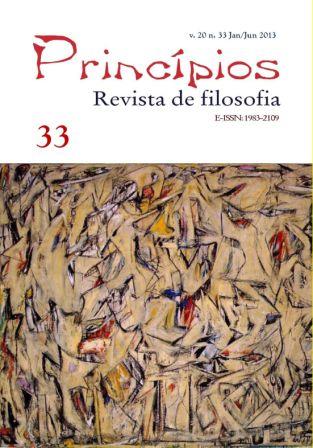MORALITY BEYOND CONTRACTUALISM
Palavras-chave:
Moral naturalism, Concept of morality, Theory of value, Contractualism, Moral preferences, Moral feelingsResumo
In this paper, I intend to outline a moral concept which
could be the bases for an immanent theory of values which is
sustained by the economy of feelings involved in the moral
confrontation characteristic of the social life of animals possessing a
complex nervous system, as is particularly the case with certain
species of mammals, including homo sapiens. What gives a moral
dimension to these feelings is the way in which they interfere with and determine the mutual behaviour of individuals within a group, and it is through this process that values are devised, sustained and transmitted. The route I will take is as follows: I will begin by discussing the problem of normativity, on the basis of an updating of the naturalist fallacy by way of the genetic fallacy, and from the point of view of a theory of value. This means that I will not approach the issue directly via the problem of duty, but by showing that it is connected to, and better understood within, a perspective of value. The choice in a moral theory of the measure of what is good in it has fundamental implications for the concept of duty, which is at the heart of of any discussion concerning normativity. This connection shall be clarified. I will then dispute the thesis that the individual (in the civil and legal sense attributed to the term by the Enlightenment) is an adequate starting-point for practical philosophy, and criticise the limits which tradition has placed on what can be considered moral whilst, by the same token, criticising classical contractualist concepts of morality which has been the bases for the majority of moral approaches in contemporary philosophy including for naturalistic ones.
Downloads
Referências
BRITO, A. N de. 2010. “Freedom and Value in Kant’s Practical Philosophy”. IN: Cultivating Personhood: Kant and Asian Philosophy. Stephen R. Palmquist (Org.). New York City: De Gruyter, 2010. pp. 265-272
_____________. 2011. “Moral Behavior and Moral Sentiments: On the Natural Basis for Universalism and Egalitarianism”. Forthcoming.
DARWIN, C. 1859. The Origin os Species. E. O. Wilson (Ed.) New York: Norton Co., 2006.
DAWKINS. R. 1976. The Selfish Gene. Oxford: Oxford University Press.
DENNETT, D. 1995 (1998). Darwin’s Dangerous Idea. Evolution and he Meanings of Life. New York: Simon & Schuster.
HOBBES, T. 1651. Leviathan. Cambridge: Cambridge University Press, 1991.
HUME, D. 1739-1740. Treatise of human Nature. Oxford: Clarendon. 2. ed. 1978.
________. 1751. An Enquire Concerning the Principles of Morals. T. Beauchamp (ed.). Oxford: Oxford. 1998.
KANT, I. 1785. Grundlegung zur Metaphysik der Sitten. Darmstadt: WBG, 1983.
_______. 1788. Kritik der praktischen Vernunft. Darmstadt: WBG, 1983.
_______. 1797. Die Metaphysik der Sitten. Darmstadt: WBG, 1983.
KITCHER, P. 1985. Vaulting Ambition: Sociobiology and the Quest for Human Nature. Massachusetts, MIT Press.
LOCKE. J. 1689. Two Treatises of Government. Kindle Ed., 2009.
MOORE, G. 1903. Principia Ethica. Cambridge: Cambridge University Press.
NAGEL, T. 1896. The View from Nowhere. Oxford: Oxford University Press.
NASH, J. 1950. "The Bargaining Problem", Econometrica. (18): 155–62.
NIETZSCHE, F. 1887. Zur Genealogie der Moral. München: Nymphenburger, 1990.
RAWLS, J. 1971. A theory of Justice. Belknap Harvard: Harvard University Press.
ROUSSEAU, J. J. 1762. The Social Contract. Kindle Ed., 2009.
RUSE, M. & E. O. WILSON. “The Evolution of Ethics”. The New Scientist, Vol 17. 1985. P. 50-52.
SCANLON, T. M. 1998. What We Owe to Each Other. Belknap Harvard: Harvard University Press
SOBER, E. & WILSON, D. S. 1998. Unto Others. Harvard: Harvard University Press
TUGENDHAT, E. 1993. Vorlesungen über Ethik. Frankfurt: Suhrkamp.
_______________. 2001b. “Moral in evolutionstheoretischer Sicht”. In: Aufsätze 1992-2000. Frankfurt am Main: Suhrkamp.
_______________. 2003. Egozentrizität und Mystik. München: Beck.
WILSON, E. 1978. On Human Nature. Cambridge, Mass.: Harvard.
Downloads
Publicado
Como Citar
Edição
Seção
Licença
Autores mantêm os direitos autorais e concedem à revista o direito de primeira publicação, com o trabalho simultaneamente licenciado sob a Licença Creative Commons Attribution que permite o compartilhamento do trabalho com reconhecimento da autoria e publicação inicial nesta revista.
Termos da licença:
| Não Comercial (NC) | Os licenciados podem copiar, distribuir, exibir e executar a obra e fazer trabalhos derivados dela, desde que sejam para fins não comerciais. |
| Compartilha Igual (SA) | Os licenciados devem distribuir obras derivadas somente sob uma licença idêntica à que governa a obra original ou menos restritiva. |


 Português (Brasil)
Português (Brasil) English
English Español (España)
Español (España) Français (Canada)
Français (Canada)


